20 years later, Battlestar Galactica still holds up
A rewatch begins as Peacock dumps Sam Esmail's planned reboot.
The TV Scholar Hall of Fame consists of shows plucked from my personal favourites list. They are shows that have made a deep impact on my relationship to television as a medium. These newsletters are less deep dives than they are spoiler-free, highlighted reminders of their impact — but scroll until the end for a list of academic recommendations if you want to dig further. Previously, I’ve written about Avatar: The Last Airbender and Sharp Objects. This month, I turn to Battlestar Galactica.
“All of this has happened before, and all of this will happen again.”
I couldn’t sleep on a recent Saturday night and I couldn’t settle on what to watch. Obviously, my watch list is endless, and on most weeks, I feel like I’m falling behind. But on a very rare occasion, I begin to crave the feeling of curling up to something familiar instead of charging ahead in a new universe. The need for comfort has loomed largely lately.
I’ve already returned to so many shows from my teen years like Sex and the City and Gilmore Girls. I’ve dipped back into Lost a few times, an enduring classic finding new viewers on Netflix as of late. But I’ve always wanted to re-experience Battlestar Galactica, a show I watched at probably 14 years old, curious because my dad said it was too gritty for his liking compared to the relatively wholesome sci-fi usually playing in our household growing up like Stargate and Star Trek.
A potential rewatch had been at the back of my mind and then boom: it was announced a few weeks ago that Sam Esmail’s long-gestating reboot was no longer in the works at Peacock, despite having found a showrunner a few months ago. It seemed obvious, then: if Battlestar wouldn’t make its way back to me, I would revisit it myself, 20 years since it first premiered.
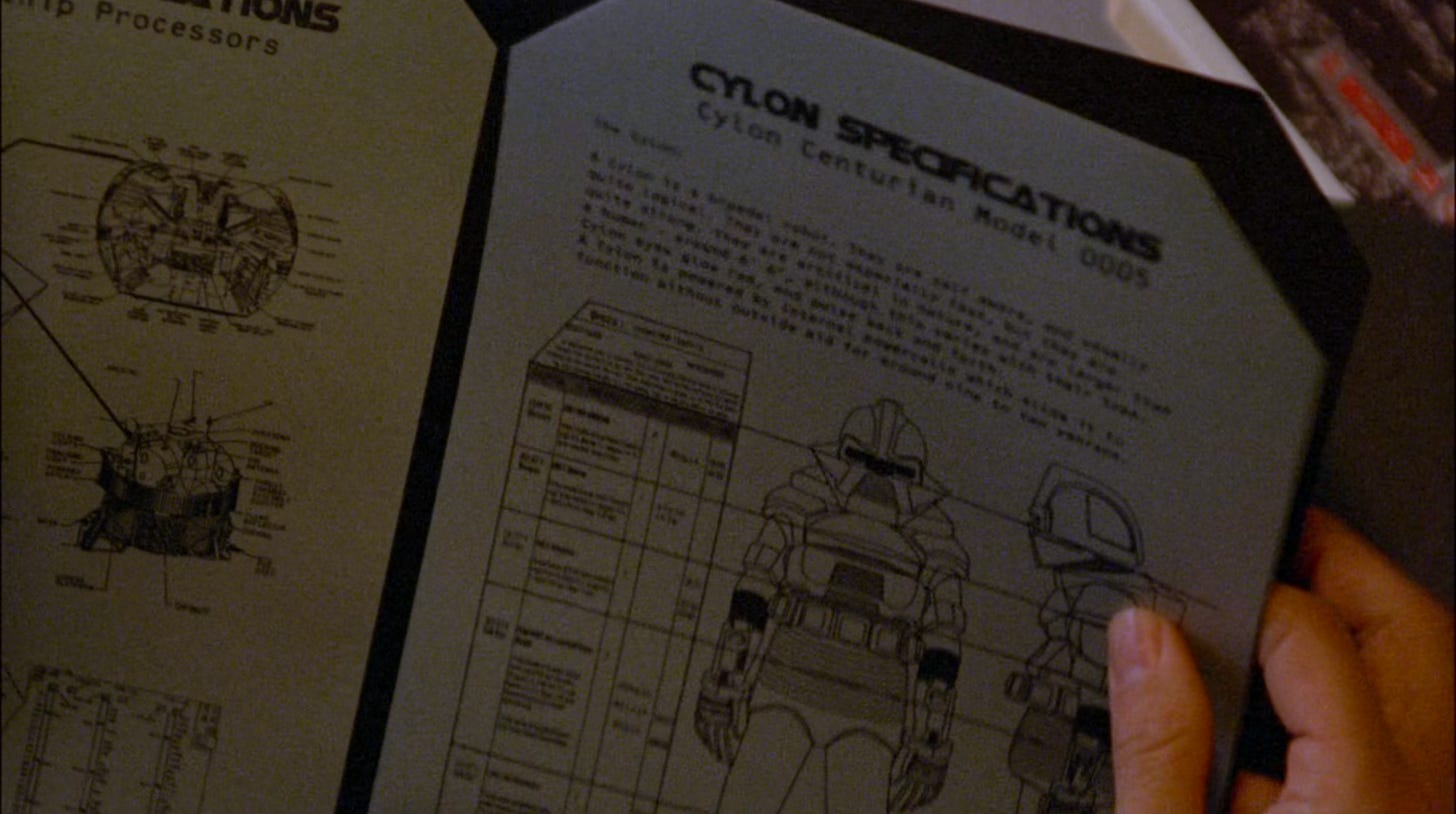
I’m the first to admit Battlestar Galactica has been harmed by having the dorkiest-sounding name for a television show. It doesn’t scream “one of the best television dramas of our time” to the average unconverted viewer, but we’re also witnessing a shift in a culture that is coming around to hard sci-fi in ways I haven’t expected (hello, Dune and The Mandalorian).
For those who haven’t had the pleasure: Battlestar Galactica is an existential, philosophical musing on AI and humanity which seems to become more relevant the further we progress into the AI gold rush. We begin this iteration of the story many years after the war between humanity and their robot creations (called Cylons). In the 2003 reboot, a remake of the original 1978 series, we begin right when the armistice between Cylons and humans is broken, and the war begins anew—but this time, Cylons have learned to take human form.
Through some back-door hacking and espionage before the attack (explored in the 2-episode miniseries that aired in 2002–which yes, is mandatory viewing before diving into the series proper), the Cylons were able to render humanity’s defense capabilities powerless to their sudden attack. It was a quick, decisive victory for “humanity’s children” (as they call themselves).
The titular Battlestar Galactica is an old creaky military ship in the process of becoming decommissioned while this is going down, led by Admiral Adama (Edward James Olmos) and Colonel Saul Tigh (Michael Hogan), two men of few words who fought in the original Cylon war. When Adama receives the call that the Cylons are attacking their homeworld (twelve planets—each named after a Zodiac sign), he barely reacts, as if he’d been emotionally preparing his entire life for their return. His skepticism of newer technology led him to keeping the Galactica disconnected from the central defense network, giving them the only fighting advantage in the war. The warship, and a ragtag group of civilian ships that had been in transit between planets during the attack, stand as the only remnants of human civilization as they essentially have no choice but to keep running from the Cylons while seeking a new suitable habitable planet.
So there’s all that juicy apocalyptic setting and hard sci-fi context, but what elevates Battlestar Galactica are the performances and writing of the ensemble cast.
Mary McDonnell plays Laura Roslin, a school teacher and a member of the government’s cabinet. She’s at the bottom of the line of succession and happens to be off-world during the attack, designating her the defacto President when the rest of the government is destroyed. She also has cancer, and is often (but not always) the more tender foil to Adama’s harsher military attitude as they wrestle around whether a decision is designated a military or political one.
Sci-fi legend Katee Sackhoff plays Kara Thrace, nicknamed Starbuck, a gender-reversal of the male character in the original series. She’s a hot head and reckless pilot but the Galactica’s most talented fighter. Her foil is Lee “Apollo” Adama (the ship commander’s son), who’s reeling from the death of his brother a few years ago.
James Callis plays Dr. Gaius Baltar, a man with a nervy disposition who is hiding the fact that it’s technically his fault that Cylons were able to hack humanity’s defense mainframe after being seduced by one of the human Cylon models played by former supermodel Tricia Helfer. Helfer is iconic in my books for being the host of Canada’s Next Top Model…a niche fact, I know. Grace Park, the only woman of colour in the starring cast, has a juicy role which I won’t spoil because it’s a significant twist in the first few episodes.
Everyone…absolutely eats? I’m talking about Emmy-level performances at every turn, even from the first few episodes. Everyone, including supporting characters, seem undeniably devoted to their role. The grief of humanity’s downfall paints every turn. Spirituality/theology is baked into the series and defines many character motivations. Everyone says “frak” instead of fuck to bypass network censorship (iconic). The show is so well-written and plotted that decisions made as early as the first episodes have repercussions later in the season. The stakes are high but even the smallest conflicts between characters always feel earned and realistic.
All of the Cylons have to play multiple versions of themselves in an Orphan Black kind of way—by the end of the series, I can’t even count the number of slightly different versions Helfer has played (her “Cylon model” is fairly sexualized; the male gaze in sci-fi is a story for another day. I’m sure Helfer and Jeri Ryan have exchanged notes). The focus on character development, including many character-specific episodes, in addition to the space stuff, comes at no surprise in hindsight from Ronald D. Moore’s more recent work on For All Mankind and Outlander.
Performances aside, Battlestar Galactica holds up remarkably well for a show that aired in the early 2000s. Since the Galactica itself is vintage, the corded phones and chunky computers are already pointed out as being old—rather than having to create a “futuristic” visual language (well, aside from the Cylons, whose spaceship interiors look like museums of modern art). The space battles aren’t bad either—they obviously don’t compare to anything out of The Expanse, but a hand-held camera effect and quick zooms help these scenes feel dynamic and alive. Although neglected from major categories, Battlestar Galactica earned a few Emmy wins and nods for visual effects, sound design, writing, and directing.
I’m always curious about how a show has been taken up by academics for further analysis. I was pleased to learn about the far-ranging impact Battlestar Galactica has had on academic study, with a diversity of methodological approaches and numerous books and articles that honestly would make for an engaging seminar (someone hire me to teach it!). In my cursory browse I found (numbers correspond to their citation at the end of this newsletter):
An article from a biblical studies journal examining the tension between polytheism and monotheism in comparison with ancient Jewish literature (12);
How the show adopted and subverted elements of the space opera genre (4);
A much-needed article that looks at the colonial/imperial angle of the show and its post-9/11 context (7);
A particularly interesting article that interviewed folks who worked on the production, including Moore and actors. It reveals quite a bit about the show’s creative constraints, representation issues (the section on race and “colour-blind casting” is fascinating), and also about how if Galactica had landed on another network it would have been sanitized of its grittier subject matter (1);
And an entire book on critical analyses on Battlestar Galactica that I would love to read but wasn’t able to access through my limited alumni library database account (10).
Sci-fi television is a tvscholar formative genre. I learned to binge-watch TV because I got obsessed with these speculative worlds. These shows paved the foundation for my understanding of television’s power as a medium, and Battlestar Galactica, despite some of its minor flaws, is absolutely worth a watch. It reminds me of Lost in so many ways, and I probably watched both shows concurrently. If you don’t trust me on this one, at least consider this Portlandia sketch. My rewatch will bring many nights of comfort ahead. So say we all!
Further reading:
Chow-White, Peter A, Danielle Deveau, and Philippa Adams. “Media Encoding in Science Fiction Television: Battlestar Galactica as a Site of Critical Cultural Production.” Media, Culture & Society 37, no. 8 (2015): 1210–25. doi:10.1177/0163443715594031.
Dillon, Grace L. “Diaspora Narrative in Battlestar Galactica.” Science Fiction Film and Television 5, no. 1 (2012): 1–21. doi:10.3828/sfftv.2012.1.
Fey, Marco, Annika E Poppe, and Carsten Rauch. “The Nuclear Taboo, Battlestar Galactica, and the Real World: Illustrations from a Science-Fiction Universe.” Security Dialogue 47, no. 4 (2016): 348–65. doi:10.1177/0967010616643212.
Francisco, Megan. “Battlestar Galactica and Space Opera: Transforming a Subgenre.” Journal of the Society for American Music 15, no. 1 (2021): 99–123. doi:10.1017/S1752196320000486.
Hellstrand, Ingvil. “The Shape of Things to Come? Politics of Reproduction in the Contemporary Science Fiction Series ‘Battlestar Galactica.’” NORA : Nordic Journal of Women’s Studies 19, no. 1 (2011): 6–24. doi:10.1080/08038740.2010.547834.
Leavenworth, Van. “Utopia, Relationality and Ecology: Resurrecting the Natural in Battlestar Galactica.” Extrapolation 53, no. 1 (2012): 61–81. doi:10.3828/extr.2012.5.
McKagen, E. Leigh. “Imagining Imperial Futures: Colonization as the Solution for Urban Uncertainty in Battlestar Galactica.” Canadian Review of American Studies 50, no. 3 (2020): 413–27. doi:10.3138/cras-2020-003.
Leavenworth, Van. “Making Starbuck Monstrous: The Poetics of Othering in Battlestar Galactica.” Journal of Popular Culture 47, no. 4 (2014): 688–708. doi:10.1111/jpcu.12156.
Milford, Mike, and Robert C Rowland. “Situated Ideological Allegory and Battlestar Galactica.” Western Journal of Communication 76, no. 5 (2012): 536–51. doi:10.1080/10570314.2011.651254.
Potter, Tiffany, and C. W Marshall. Cylons in America : Critical Studies in Battlestar Galactica. 1st ed. New York: Continuum, 2008.
Rose, Margaret. “Cyborg Selves in Battlestar Galactica and Star Trek: The Next Generation: Genre, Hybridity, Identity.” Journal of Popular Culture 48, no. 6 (2015): 1193–1210. doi:10.1111/jpcu.12355.
Sheinfeld, Shayna. “The Old Gods Are Fighting Back: Mono- and Polytheistic Tensions in Battlestar Galactica and Jewish Biblical Interpretation.” Journal for Interdisciplinary Biblical Studies 3, no. 1 (2021): 1–19. doi:10.17613/sm81-6k10.

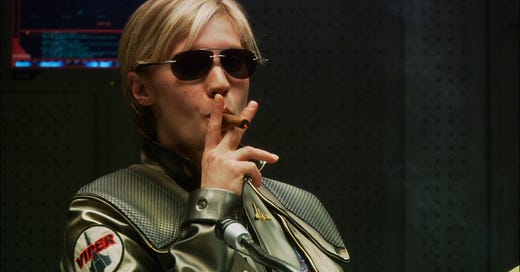



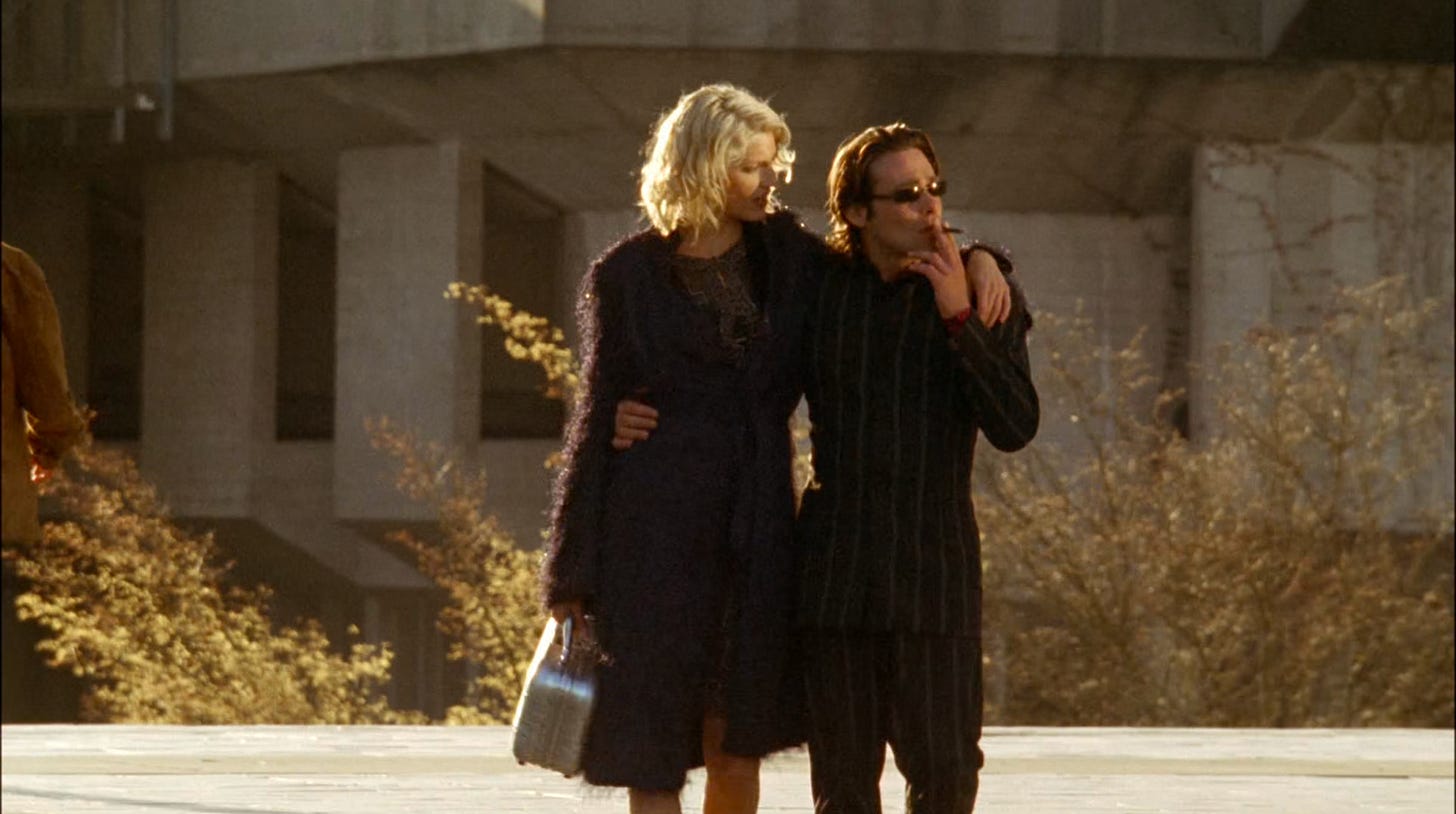
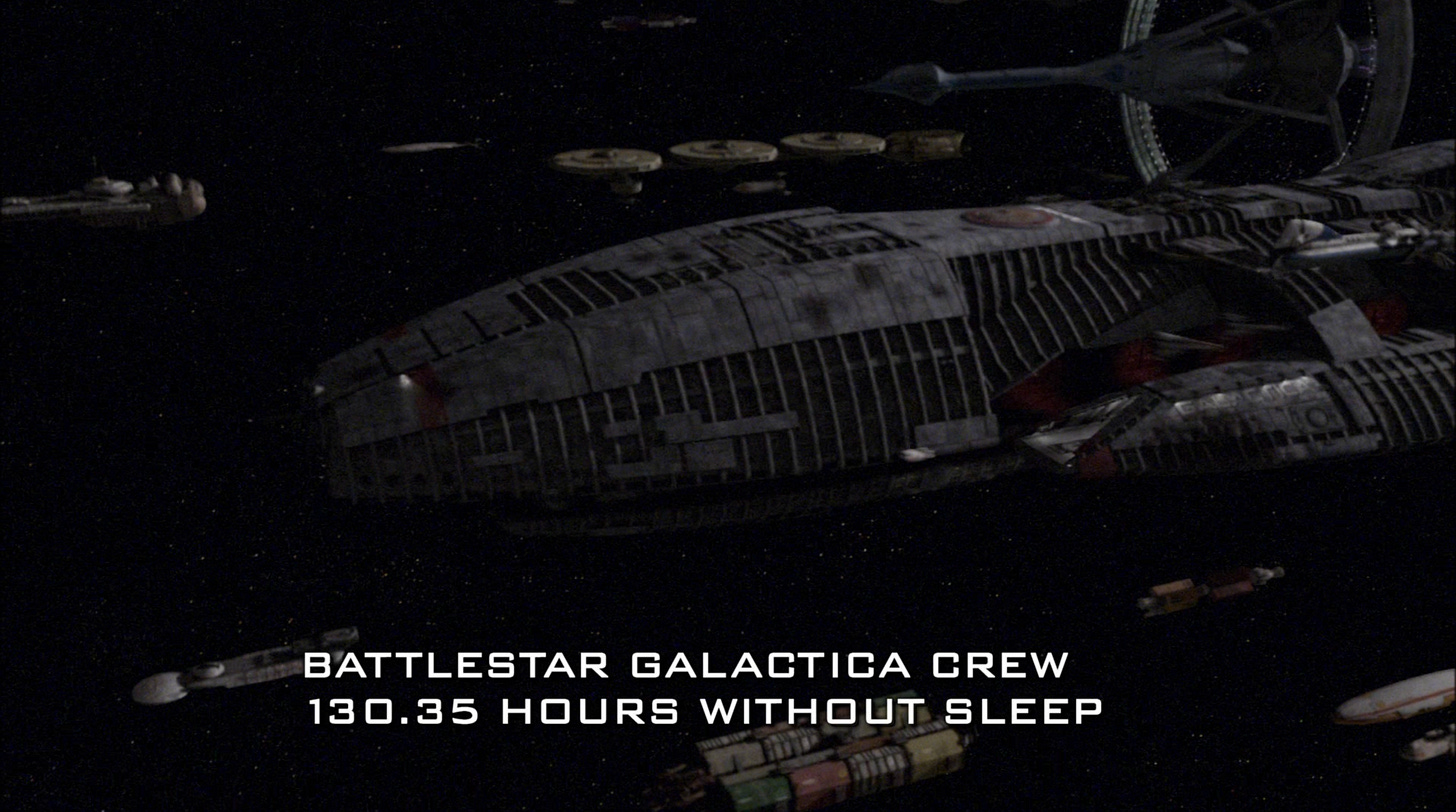
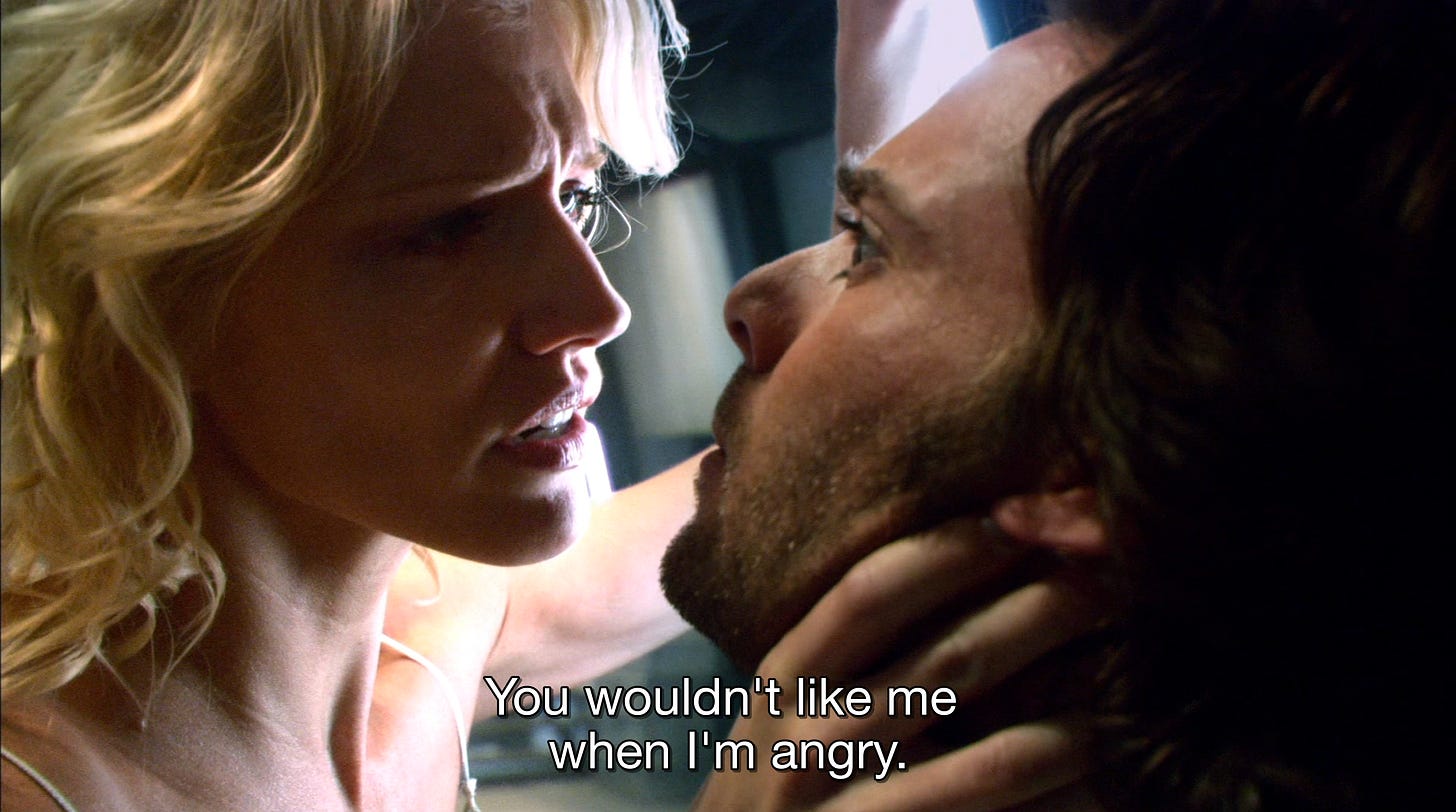

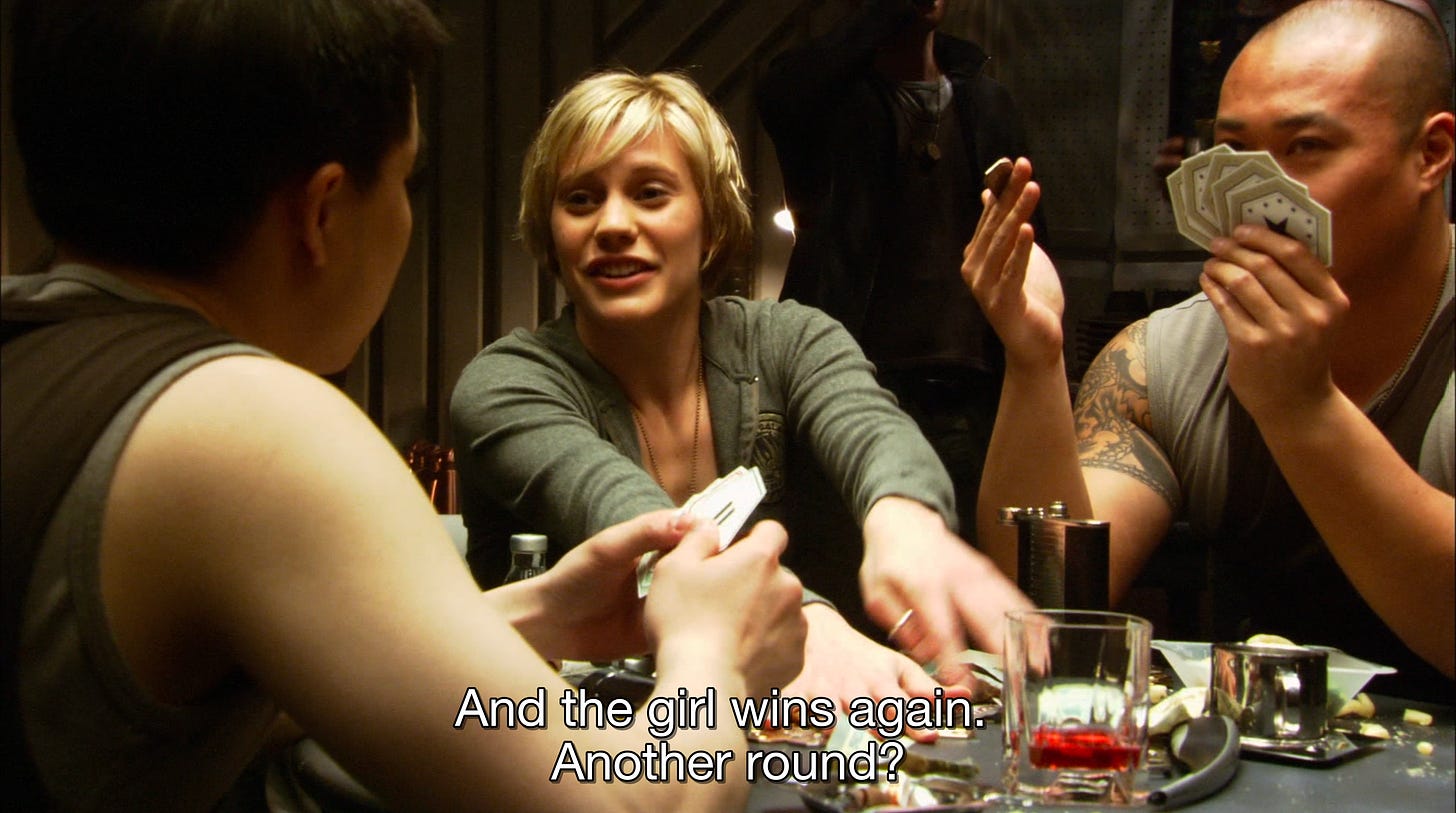
So say we all!! One of my all-time favorite tv shows…and one I am loathe to rewatch too many times, lest I dim its magic. I’m saving it for next fall, which will be exactly 10 years since my first watch!!
I've always thought that BSG was overlooked (the reboot)... it touched on so many topics that are worthy of discussion- torture as an effective interrogation technique, the monotheism angle, the juxtaposition of human robots and humans.... just name a few ideas. I loved this show when it aired and I still love this show! Thanks for writing about it!!!!